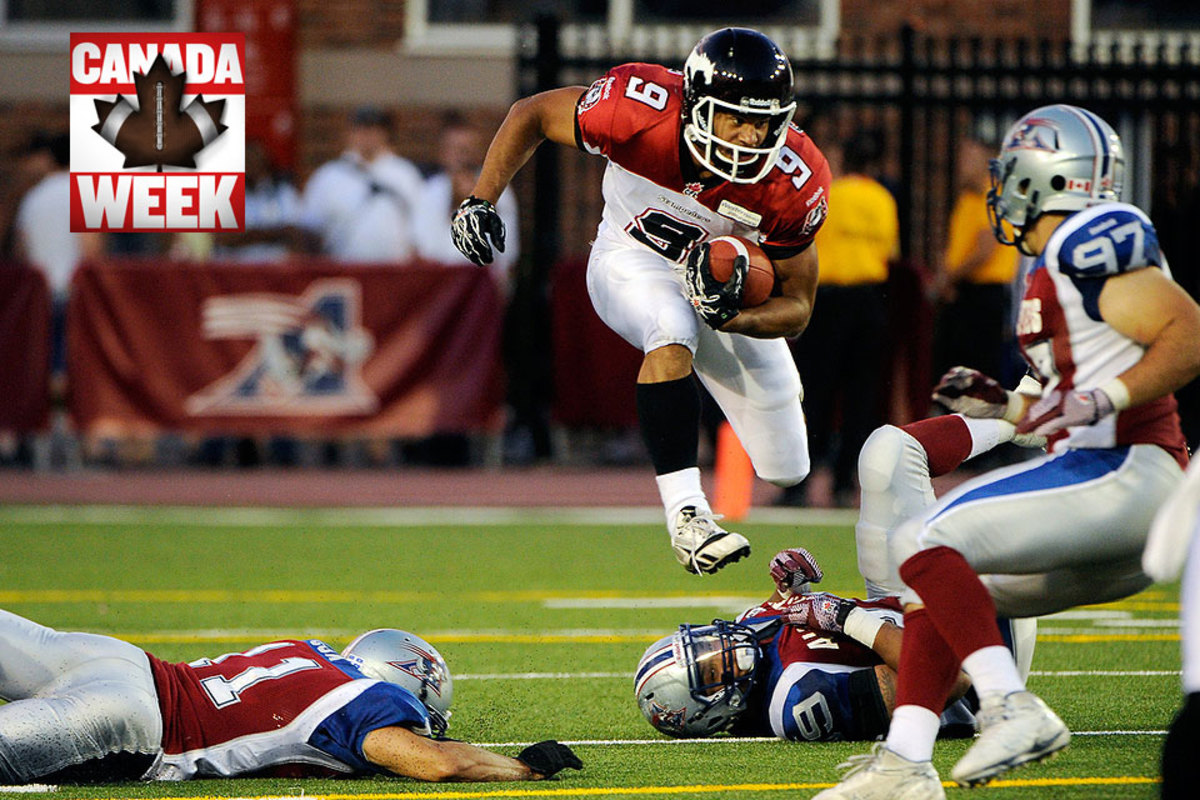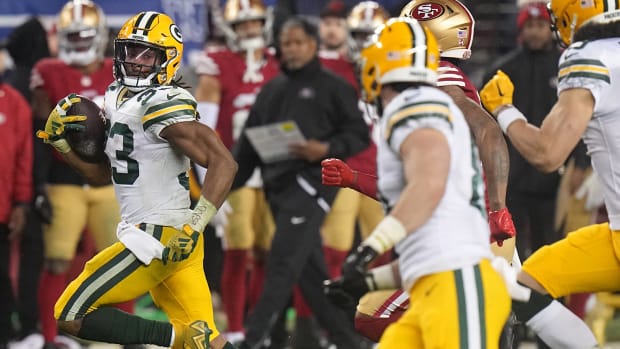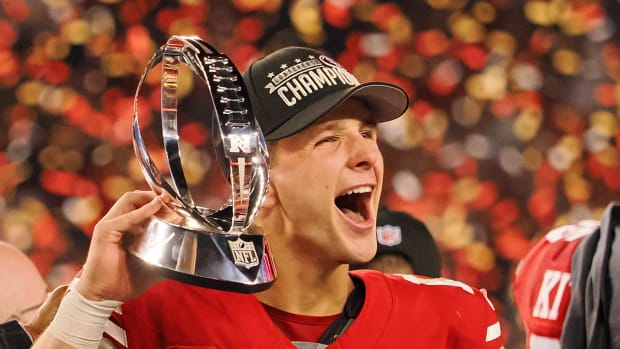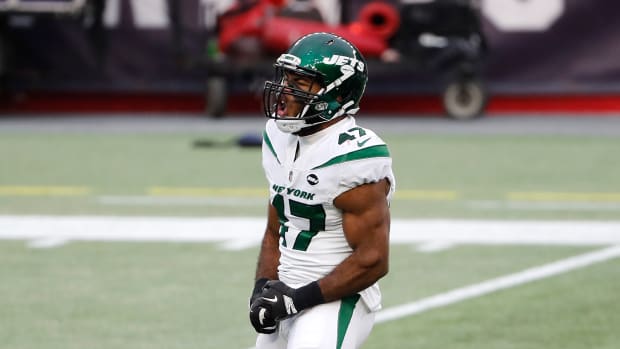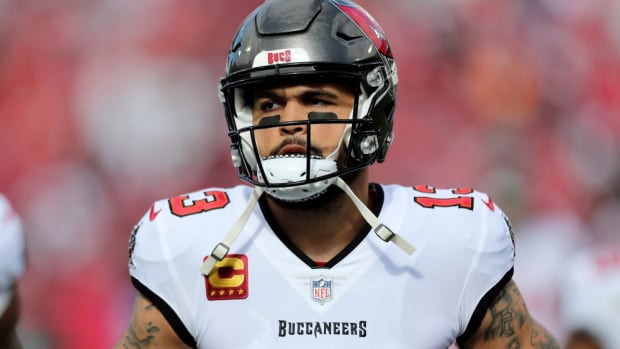The CFL’s Most Outstanding Player Moonlights as a Banker
A man walks up to the bank window. “Wow,” the man says to the teller. “You look exactly like Jon Cornish, the running back for the Calgary Stampeders.”
The bank teller smiles. He’s bald, like Cornish, has broad shoulders, like Cornish, and that grin? It looks awfully familiar.
Another customer from the back of the line interjects. “Hold up,” he says. “That doesn’t just look like Jon Cornish, that is Jon Cornish!”
“The whole scene seems a bit corny,” says the bank teller, who is in fact the real Jon Cornish. “But that’s my life. Interactions like that happen all the time.”
Cornish, the 29-year-old British Columbia-born, Kansas-schooled running back is the reigning Canadian Football League Most Outstanding Player. Last year, he broke his own single-season rushing record with 1,813 yards, led the league with 2,157 yards from scrimmage and scored 14 touchdowns. When he’s not wearing his No. 9 jersey, he suits up (literally) for his second job at a TD Canada Trust branch near a mall in Calgary.
During the season, Cornish squeezes in two six-hour bank shifts per week. In the seven-month offseason, he may work four or five days a week. “It’s a way I can get jumpstarted on my post-playing career,” he says. “But truth is, I really love both of my jobs.”
His story epitomizes the community-oriented CFL, and it’s also reminiscent of the NFL from decades past, when salaries were far lower and players like Cornish weren’t anomalies.
Monday—Marc Trestman: Welcome to Canada Week
Tuesday—Doug Flutie: Reflections on my time in CFL
Wednesday—Bruce Arthur: The CFL’s small-town charm
Friday — Jenny Vrentas: Toronto-Winnipeg opening night
Monday — Peter King: MMQB from Calgary and Regina
Take three NFL Hall of Famers, for example. Giants linebacker Sam Huff won a championship as a rookie in 1956. His $7,500 paycheck barely covered New York City living expenses, so he returned to West Virginia over the summer and bagged groceries. Y.A. Tittle moonlighted as an insurance salesman and Oilers defensive end Elvin Bethea worked at a Big & Tall clothing store in the offseason. The manager initially placed the 6-foot-2, 260-pound Bethea in the front of the store to greet customers. But when too many fans stopped by to ask for autographs or simply gawk, Bethea was granted his wish to work in a back room.
Cornish can relate. The bank customer who recognized him was wearing Cornish’s Stampeders jersey. Since the Cornish Flakes cereal hit the shelves of the Calgary Co-op in May, he’s been recognized more and more. “Plenty of fans get excited when they see Jon,” says Tony Yu, the bank’s branch manager. “But we value him for his work ethic. He’s great with customers.”
The number of CFL players with secondary careers is dwindling; Stampeders communications director Jean LeFebvre estimates that only 10% of the 43-man roster works offseason jobs. It’s a trend that coincides with the league’s growth. A new TV deal with TSN is reportedly worth $43 million annually, more than 2.5 times the previous $15 million per year. Yet second jobs are still far more common in the CFL than other sports leagues, especially the NFL.
The CFL’s recently ratified collective bargaining agreement set the salary cap at $5 million per year, per team—an uptick from the previous $4.4 million. For perspective: Atlanta Falcons quarterback Matt Ryan took home $42 million last year, enough to cover the salaries of every CFL player. Most estimates peg the average CFL salary around $80,000. The minimum for a rookie is $50,000. The Houston Texans No. 1 pick, Jadeveon Clowney, by contrast, will earn a $420,000 base salary (with a $3.6 million prorated bonus) in 2014.
While Cornish would not reveal his salary, the eight-year veteran emphasized he doesn’t need the extra income from working in a bank to make ends meet. He interviewed for the job in January 2013 at the insistence of his girlfriend’s father. Before that, Cornish said he “played way too many video games” and knew he could use his free time more effectively. As his college coach Mark Mangino tells it, Cornish preferred to hang out “in academic circles” rather than with teammates at Kansas. He majored in psychology, minored in women’s studies, and was often spotted reading books at the training facility.
“But the kid could play,” Mangino says, pointing to Cornish’s senior season in which he averaged 5.8 yards per carry and totaled 1,457 yards—both Jayhawks single-season records. Invited to the NFL Scouting Combine, but undrafted, Cornish didn’t sulk. “I think I may have let it be known too overtly that I would love to come back and play in Canada,” he says. Cornish joined the Stampeders in 2007 and signed a five-year extension in 2011.
Once my playing career is over, the revenue stream is going to stop," says Cornish. "NFL players get a bit more of a cushion to fall back on. For the CFL, there’s a bit more of an urgency.
TD Bank is a great fit for a CFL player, Wu says, because it’s open from 8 a.m. to 8 p.m., seven days a week, allowing Cornish to be flexible with shifts that fit around his football schedule.
Cornish, an aspiring investment manager, completed the Canadian Securities Course last winter. He knows football won’t last forever, and he understands how hard it would be to apply for an entry-level job in his late 30s rather than his 20s. He’s grateful for the push from his girlfriend’s father. “I knew I would need a job eventually,” Cornish says. “Once my playing career is over, the revenue stream is going to stop. NFL players get a bit more of a cushion to fall back on. For the CFL, I suppose there’s a bit more of an urgency.”
Roughriders running back Kory Sheets, the 2013 Grey Cup MVP, understands that, too. The 29-year-old Connecticut native signed with the Oakland Raiders in February. But during the two months before he was scheduled to report to Oakland, Sheets kept his job unloading pieces of oil rigs for a trucking company in Saskatchewan.
Before signing with the Raiders, 2013 Grey Cup MVP Kory Sheets (right) worked for a trucking company in Saskatchewan. (Courtesy @TheRiderman63)
Argonauts wide receiver Mike Bradwell, a civil engineer in the offseason, celebrated winning the Grey Cup in 2012 by bringing the trophy to one of his construction sites. Cornish’s teammate, punter Rob Maver, works an office job where he helps manage properties and maintenance services for large companies (lucky for Maver, his two bosses are Calgary Stampeders season-ticket holders).
Patrick Kerney loves to hear these kinds of stories. An 11-year veteran of the NFL, Kerney is now the league’s vice president of player benefits. He sees a problem with financial literacy among NFL players and wants to train them to think with a long-term perspective. “You look at guys like Jon Cornish, or Matt Elam, and they understand,” Kerney says.
Elam is the Ravens’ 2013 first-round pick who took a job as a part-time sales associate at a sneaker store this offseason. He’s clocking about 20 hours a week at the Finish Line in a Gainesville, Fla., mall, working the floor and stocking shelves. “A historical pattern for players has been: ‘I want to get in the shoe business, how about I give a guy $500,000 to start a shoe business,’ ” Kerney says. “Elam said, ‘No, I want to throw my human capital at it, and I’ll get so much more out of it.’ "
Kerney doesn’t expect all NFL players to get offseason jobs. He does, however, want them to pay attention to opportunity cost—thinking about investments, extra degrees and post-playing opportunities during the beginning stages of their careers. Next offseason, the NFL will offer a personal finance program seminar in offseason hotbeds such as Miami and Southern California.
“Just to get guys thinking on the same wavelength as Cornish or Elam,” Kerney says. “Those guys really get it.”
In 2013, Cornish won the Lou Marsh Trophy, the annual award given to Canada’s top athlete. He was the first CFL player to receive the honor since 1969. When Cornish found out, he was still on his shift at the bank. Only when he got his scheduled break did he conduct a conference call with reporters.
































